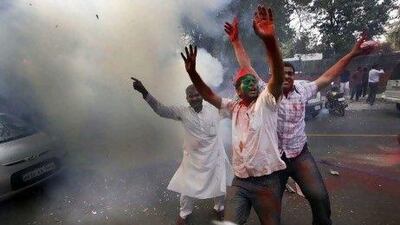NEW DELHI // Crucial state polls in five Indian states have dealt a crushing blow to the ruling Congress party and the hopes of its leader-in-waiting, Rahul Gandhi - the standard bearer of the Nehru-Gandhi dynasty that has dominated the country since it was formed in 1947.
The party won just two states and came fourth in the barometer northern state of Uttar Pradesh, India's most populous.
In each of the five states - Uttar Pradesh, Punjab, Goa, Uttarakhand and Manipur - the lack of development and the corruption at local and national levels dominated for disillusioned voters.
Despite more than 200 speeches and campaigning from his charismatic sister, Priyanka, the heir to the powerful Nehru-Gandhi dynasty failed to capitalise on a dramatic loss of support for the incumbent, "Dalit Queen" Mayawati.
The five-year term of Mayawati, a member of the low cast once known as the untouchables, was marked by corruption scandals and a hubristic obsession with building statues of herself and other untouchable icons at the expense of economic development in one of the country's poorest states.
But Congress won just 28 seats in Uttar Pradesh's 403-seat assembly, plus another nine through a local ally, a minimal improvement over the 22 it won in 2007.
Congress lost in the family strongholds of Rai Bareilly and Amethi in the heartland of Jawaharlal Nehru, Mr Gandhi's great-grandfather and the man who presided over the handover of power from the British Raj.
"We have not done well," Mr Gandhi told reporters in the state capital of Lucknow, breaking with a party line that had tried to insulate him from blame.
"The responsibility is mine, since I was there leading the campaign. I take it in my stride. This is a good lesson for me."
Voters instead went with another young political scion, Akhilesh Singh Yadav, who led the Samajwadi Party to a thumping majority, with 224 seats.
Mr Yadav moved the party away from its thuggish reputation and Luddite aversion to computers and English-language education that it earned under his father, Mulayam Singh Yadav, a three-time chief minister.
"Akhilesh combined a sense of modernity while still speaking to UP's rural population," said SS Rana, a former civil servant and regular political commentator in Lucknow. "He also had a humble disposition which people flocked around."
Despite his prominent role in the campaign, Akhilesh Yadav says the role of chief minister still belongs to his 72-year-old father.
The result may be a setback for Mr Gandhi, but it is unlikely to end his hopes of becoming prime minister.
In India's fractious, caste and religion-driven politics, national parties such as Congress often fare poorly in state elections, where voters are more concerned about local issues.
"The fact remains that there is no contest for the position within the party after [prime minister] Manmohan Singh," said Jatin Gandhi, author of a recent book on Mr Gandhi.
"The real question is whether the Congress is in a position to form the next government at the centre. If the elections were held today, the clear answer would be 'no' and if the Congress continues to perform in this fashion, both electorally and on governance issues, the scenario will not change in 2014."
That the party failed to wrest back control of Punjab may be an even bigger concern than the Uttar Pradesh results.
It is the first time a governing party in Punjab has returned to power, with the Shiromani Akali Dal taking 68 seats to Congress's 46 in the 117-seat assembly.
And that despite slowing economic growth and rampant corruption in the once-prosperous state, which has 800,000 unemployed college graduates.
Parkash Singh Badal, 84, will return as chief minister for the fifth time.
Congress also lost power in the tourist hot spot of Goa. Here it was local corruption - based around allegations that ministers were involved in a multi-million-dollar illegal mining industry - that helped the Hindu nationalist opposition Bharatiya Janata Party (BJP) to victory.
In Uttarakhand, which borders China and Nepal, Congress squeaked through by a single seat over the BJP, but smaller parties and independents will decide who forms the next government.
This was a particularly unimpressive result for Congress given that the BJP chief minister, Ramesh Pokhriyal Nishank, was forced to resign just six months ago over corruption allegations.
A more emphatic success for Congress came from the remote north-eastern state of Manipur.
The state has suffered decades of secessionist insurgency, a series of corrupt and ineffective governments and, in recent months, crippling road blockades by competing tribal groups.
But with a weak and fragmented opposition, the Congress romped back to victory, taking 42 seats in the 60-seat assembly.
sbhattacharya@thenational.ae
erandolph@thenational.ae
Follow
The National
on
Surya Bhattacharya on
& Eric Randolph on

